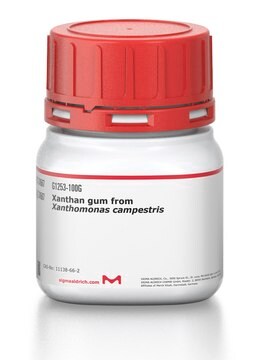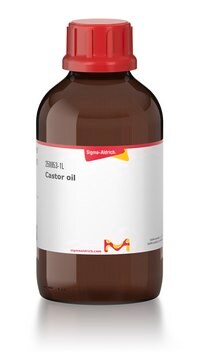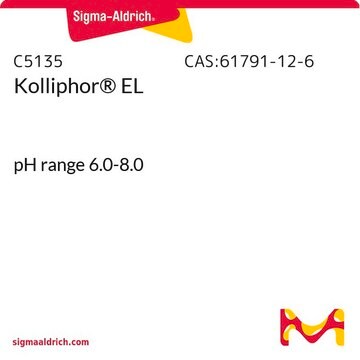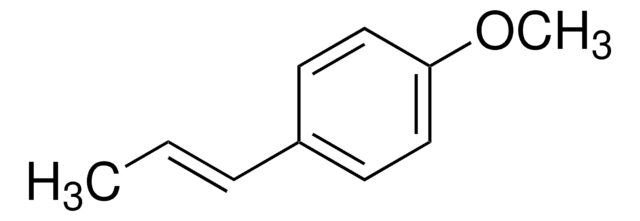Wszystkie zdjęcia(1)
Key Documents
12-1820
Gum arabic from acacia tree
CP
Synonim(y):
Acacia gum
Zaloguj sięWyświetlanie cen organizacyjnych i kontraktowych
About This Item
Polecane produkty
klasa czystości
CP
dostępność
available only in Japan
Szukasz podobnych produktów? Odwiedź Przewodnik dotyczący porównywania produktów
Inne uwagi
Believed to be a branched polymer of galactose, rhamnose, arabinose, and glucuronic acid as the calcium, magnesium, and potassium salts with a mol. wt. of approx. 250,000.
This page may contain text that has been machine translated.
Kod klasy składowania
11 - Combustible Solids
Klasa zagrożenia wodnego (WGK)
WGK 3
Temperatura zapłonu (°F)
Not applicable
Temperatura zapłonu (°C)
Not applicable
Środki ochrony indywidualnej
dust mask type N95 (US), Eyeshields, Gloves
Certyfikaty analizy (CoA)
Poszukaj Certyfikaty analizy (CoA), wpisując numer partii/serii produktów. Numery serii i partii można znaleźć na etykiecie produktu po słowach „seria” lub „partia”.
Masz już ten produkt?
Dokumenty związane z niedawno zakupionymi produktami zostały zamieszczone w Bibliotece dokumentów.
Lynne A Isbell et al.
American journal of physical anthropology, 150(2), 286-300 (2013-01-03)
Patas monkeys (Erythrocebus patas) are midsized primates that feed extensively on the gum of Acacia drepanolobium and the ants are housed in swollen thorns of this Acacia. Their diet resembles that expected more of smaller bodied primates. Patas monkeys are
Susana Soares et al.
Journal of agricultural and food chemistry, 60(15), 3966-3972 (2012-03-24)
Condensed tannins are a group of polyphenols that are associated with the astringency sensation, as they readily interact and precipitate salivary proteins. As this interaction is affected by carbohydrates, the aim of this work was to study the effect of
Aline Grein et al.
Carbohydrate polymers, 92(1), 312-320 (2012-12-12)
Polysaccharides (GNF) from Acacia mearnsii de Wild gum exudates, collected from trees growing in the south of Brazil, were characterized ((13)C and HSQC NMR, GC-MS, colorimetric assays). A commercial gum arabic (GAC) was analyzed similarly and compared with GNF. There
Baomin Wang et al.
Journal of nanoscience and nanotechnology, 12(6), 4664-4669 (2012-08-22)
Stable homogeneous suspensions of multi-walled carbon nanotubes (MWCNTs) were prepared using gum arabic (GA) as a dispersant. By measuring adsorption isotherm, the surface chemical properties of the MWCNTs were investigated. The dispersion of MWCNTs in aqueous solution was examined with
Rasha Babiker et al.
Nutrition journal, 11, 111-111 (2012-12-18)
Gum Arabic (acacia Senegal) is a complex polysaccharide indigestible to both humans and animals. It has been considered as a safe dietary fiber by the United States, Food and Drug Administration (FDA) since the 1970s. Although its effects were extensively
Nasz zespół naukowców ma doświadczenie we wszystkich obszarach badań, w tym w naukach przyrodniczych, materiałoznawstwie, syntezie chemicznej, chromatografii, analityce i wielu innych dziedzinach.
Skontaktuj się z zespołem ds. pomocy technicznej







